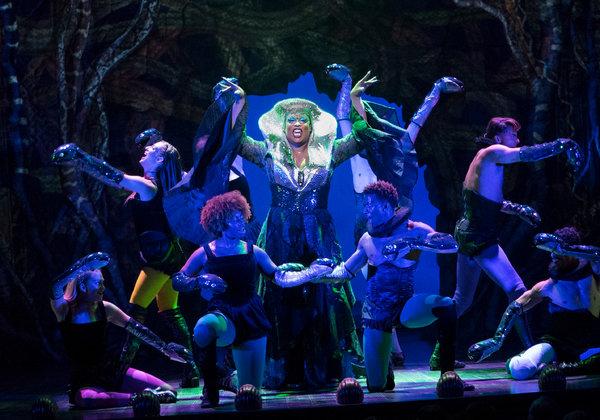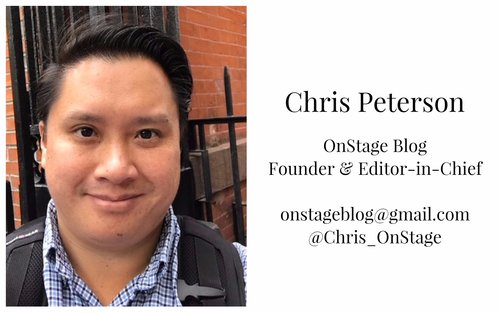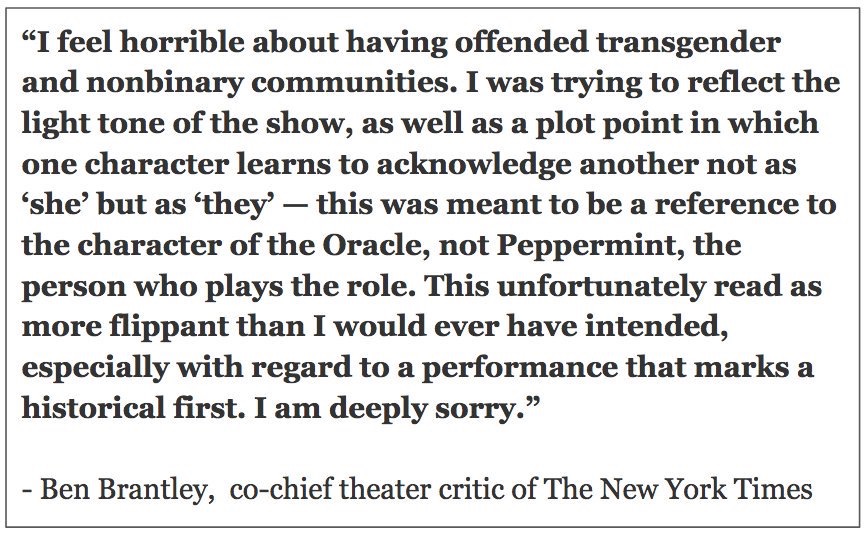NY Times Critic Uses Trans Pronouns as Punchline in "Head Over Heels" Review
Peppermint in "Head Over Heels" (Sara Kruwich/NY Times)
Never one to shy away from causing a stir, New York Times Chief Theatre Critic, Ben Brantley, has crossed a line with many due to his review of Head Over Heels which opened at the Hudson Theatre last night.
In his review, Brantley discusses the performer Peppermint with the following:
These assorted role reversals are overseen by the wise oracle Pythio (Peppermint, a contestant on “RuPaul’s Drag Race,” described in the program as “the first transgender woman to create a principal role” on Broadway). Pythio identifies as “nonbinary plural.” Dametas (Tom Alan Robbins), the King’s viceroy and father of Mopsa, finds himself strangely drawn to her — I mean them.
This comment would be enough to get the boiling but earlier in the review, Brantley said this:
Still, this shotgun wedding of song and script promised to be a piquant novelty among jukebox musicals, a form that has been multiplying (and dividing) like amoebas since the Abba-stoked “Mamma Mia!” conquered the world. And its dichotomous nature matches the didactic thrust of a show that celebrates the importance of not being (and pardon me, for trotting out what’s starting to feel like the decade’s most overused word) binary.
In addition to agreeing with anyone who would call these comments pretentious, I would also agree with anyone who would call them transphobic.
For those who don't know much about these terms. According to the National Center for Transgender Equality, "People whose gender is not male or female use many different terms to describe themselves, with non-binary being one of the most common. Other terms include genderqueer, agender, bigender, and more. None of these terms mean exactly the same thing – but all speak to an experience of gender that is not simply male or female."
The National Center for Transgender Equality also lists a number of ways to be respectful toward non-binary people. Using their pronouns as a punchline in a theatre review is far from one of them.
While I was worried that this might be a trend with cisgender people reviewing Head Over Heels, virtually every other NY critic understood what it meant to have non-binary stories told in a Broadway show. In fact, our own critic Jordan Nickels, said the following in his review of the show during it's premiere in San Francisco.
"While queer artists have always been well represented in theater, their stories are rarely played out as beautifully as they were in Head Over Heels. This musical also adds to the gender discussion, presenting for the first time a non-binary character. Never would I think the pronouns of a non-binary character (they/them) would be belted out in a Broadway-bound musical, a historic moment for contemporary theater."
When it comes to the usage of pronouns, I do think we're at a crossroads. More and more performers are making their pronouns known and it's on journalists and critics to respect that. Last week, a performer emailed us to ask that we correct their gender in our review from the incorrect "Ms." to "Mx.". In addition to making sure we made that change, I personally thought "Mx." looked very cool. Education and enlightenment doesn't take a lot of time either. Websites such as transequality.org give some great information.
But Brantley's review marks a turbulent week for the NY Times theatre criticism staff. Earlier this week critic, Laura Collins-Hughes, was called out for body shaming actress Alysha Umphress in her review of Smokey Joe's Cafe. Collins has yet to apologize for her remarks. I don't expect her to and I don't expect Brantley to either.
Obviously, in the course of writing reviews of these shows, Collins and Brantley had no idea what the other was saying(unless Brantley is the editor for theatre reviews which I don't believe he is). But the people that do see these reviews are the editors. So I have to questions, especially after the Collins issue, why arts editors Scott Heller or Jake Silverstein didn't catch Brantley's comments and edit them before publishing? Do neither of them understand these issues? Does Brantley have carte blanche to write anything he wants free of editing?
While editors sometimes can't predict what will or won't offend people or what's considered out of line, surely body shaming and using non-binary as a joke would stand out pretty quickly, no? Then again this is what happens when you keep hiring white cisgendered men for these positions at the Times.
In an era where the New York Times finds themselves fighting battles on many levels, they're certainly to blame for instigating some of these fights.
Update: Ben Brantley has released a statement regarding the backlash and apologized.


